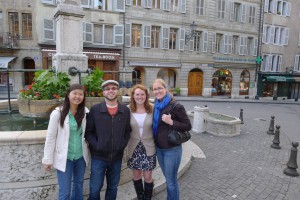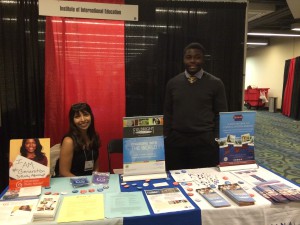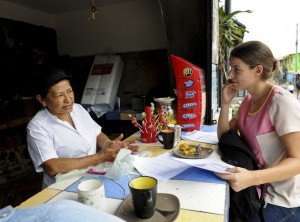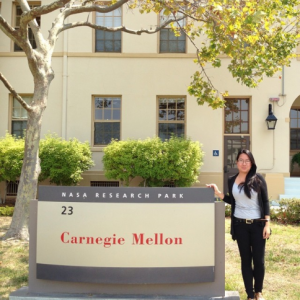Our Fulbright Program recap for last week highlights all the festive Fulbright Thanksgiving meals that occurred around the world! Thanks for sharing your #FulbrightThanksgiving moments with us!
The Art of Swiss Compromise: Reflections on a Fulbright Study/Research Grant
November 27, 2014‘No ideas but in things’
– William Carlos Williams, American poet

Caroline Kirby, 2012-2013, Switzerland (far right), with fellow Fulbright U.S. Students (left to right) Kun-Wei, Tevor, and Caitlin in Geneva’s Old Town. (Photo credit: Adam Duker)
I took a metaphorical page from William Carlos Williams’ book when I started my life in Geneva, Switzerland. Instead of reading about the region’s culture, while a full-time student at Université de Genève, I experienced it in the banal and quotidian. And as a result, I learned to consider the needs and preferences of others before my own.
I discovered that certain concepts like punctuality and work-life balance are expressed much more elegantly on paper than they are experienced in daily life. The locked doors of lecture halls and offices, for example, shamed my American tendency to arrive ‘fashionably late’ for events and appointments. And the sanctity of Sunday, when most shops and libraries remain closed, disrupted my typical seven-day-week rhythm of productivity.
I also saw the lofty notion of compromise embodied in everyday local practices. Trams, cars and bicycles respect reserved lanes and stop lights. Official documents contain at least three languages (German, French, and Italian) to accommodate the language preferences of Swiss citizens. And French and German language television networks temporarily exchange newscasters to express appreciation for the language of others.
Thanks to the Fulbright community for all of your great #IEW2014 tweets!
November 25, 2014My First Hackathon: Gaining Knowledge and Connections While Having Fun
November 20, 2014In honor of International Education Week, today’s post illustrates Thursday’s theme of Entrepreneurship, and how international education prepares students for a strong, globalized 21st century workforce.
Read how Panamanian Fulbrighter and information technology student Susana Lau participated in her first hackathon this past October – a unique opportunity that enhanced her skills and widened her professional network.
From the moment I arrived in the United States from Panama to begin my graduate studies at Carnegie Mellon University (CMU), I knew my life would change. Being exposed to the professional, technological, and educational environment at CMU, as well as all of the opportunities available to help me pursue my goals, have transformed how I perceive my personal and professional growth.
I feel so fortunate to be a Fulbright Foreign Student pursuing CMU’s bi-coastal Master’s in Information Technology, where I spent my first year in Pittsburgh, Pennsylvania. This year, my second year, has been spent in Silicon Valley, where I’ve been exposed to the area’s characteristic spirit of entrepreneurship, innovation and technology. The extracurricular activities offered here are incredible: networking, technical conferences, and hackathons. I encourage other students to take advantage of these types opportunities.
Many of you may have seen Fulbright around your town lately. Here’s a recap of where we’ve been in the past month!
Washington, D.C.:
The Fulbright Program and Gilman Program were represented at the Thurgood Marshall College Fund’s Leadership Institute by alumni and the Institute of International Education staff. This event hosts over 450 students from from public Historical Black Colleges and Universities (HBCU) and teaches them skills they need to be competitive in the marketplace.

Fulbright and Gilman Program alumni shared their excitement from their experiences with students interested in studying abroad at the Thurgood Marshall College Fund’s Leadership Institute.
Fulbright Student and Scholar Program Alumni hosted the Fulbright Alumni Photography Exhibit at The Atrium Gallery at the Ronald Reagan Building. Fulbright Alumni Ambassador, Kristen Erthum, presented on Nov. 8, at the gallery on her experience as an English Teaching Assistant in Egypt. Visit the gallery’s Facebook page to learn more.

Jenna Harvey, 2013-2014, Costa Rica, conducts an interview with a small business owner in the informal settlement of La Carpio; Photo credit: Perfil Magazine, 2014
Costa Rica’s central valley is surrounded by stoic cloud-capped mountains and teeming with life—70% of the country’s population to be exact—working, studying and raising families in the sprawling metropolis of San José and its surrounding areas. One of the best views of the buzzing valley is from La Carpio, an informal settlement perched atop the entrance to the country’s largest trash dump and enclosed on the sides by a water-treatment plant and a quarry. La Carpio’s favorable view is just one of many unexpected features of this fascinating community, home to over 20,000 people, about half of whom are immigrants from neighboring Nicaragua.
As a Fulbrighter in La Carpio, my research was focused on the spectrum of informal economic exchanges taking place there: from street vendors peddling their goods on corners to successful micro-entrepreneurs selling products and services from storefronts. I specifically focused on the participation of women in the informal economy of La Carpio and how their efforts have contributed to the economic development of a place that began as a squatter settlement in an abandoned coffee field.
My research objectives were two-fold: gain a better understanding of “urban informality” by identifying both success factors and limiting factors for informal workers, and uncover ways that small-business creation and entrepreneurialism could create a much needed bridge between the migrant women of La Carpio and the Costa Rican women of San José. To accomplish my second objective, I collaborated with a women’s microfinance organization in San José, to foster dialogue about the potential for services to be extended to migrant women living in marginalized areas like La Carpio.

